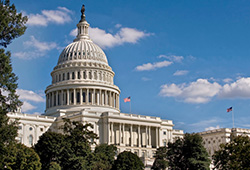 On July 13, 2021, the Senate Judiciary Committee’s antitrust panel met to discuss biologic and biosimilar competition and its impact on drug prices. A group of senators, led by Senator Amy Klobuchar, are sponsors of a Senate bill which aims to prohibit biological product manufacturers from compensating biosimilar and interchangeable biological companies in exchange for delaying entry of those biosimilar and interchangeable biological products. Preserve Access to Affordable Generics and Biosimilars Act, S. 1428, 117th Cong. (2021). According to the bill, these payments, also known as reverse payment settlements, often result in delays to biosimilar entry onto the market.
On July 13, 2021, the Senate Judiciary Committee’s antitrust panel met to discuss biologic and biosimilar competition and its impact on drug prices. A group of senators, led by Senator Amy Klobuchar, are sponsors of a Senate bill which aims to prohibit biological product manufacturers from compensating biosimilar and interchangeable biological companies in exchange for delaying entry of those biosimilar and interchangeable biological products. Preserve Access to Affordable Generics and Biosimilars Act, S. 1428, 117th Cong. (2021). According to the bill, these payments, also known as reverse payment settlements, often result in delays to biosimilar entry onto the market.
In the July 13 meeting, the Senate subcommittee, along with drugmakers and lobbying groups including America’s Health Insurance Plans (“AHIP”), discussed a practice often known as “patent thicketing,” through which patent holders apply for secondary patents in addition to existing patents on biologics. In its statement to the Senate subcommittee, AHIP recommended advancing policies including: (1) shortening the exclusivity period for biologics; (2) prohibiting reverse settlement payments resulting in delays to biosimilar entry; and (3) ending the practice of “patent thicketing,” where a drug company applies for secondary patents after making minor changes to a drug’s chemical composition, which may make it more difficult for patent challengers to enter the market.
Other groups, including the Mercatus Center at George Mason University and the industry group Pharmaceutical Research and Manufacturers of America, urged Congress to reconsider legislation that would change intellectual property law, noting that drug companies develop new medicines within the framework of the current patent system. In contrast, a representative of Fresenius Kabi reported that “[w]hile it costs just $25,000 for a major drug company to secure one of the secondary patents, it would take $1 million for a rival to pursue a single Patent Trial and Appeal Board review of that one patent.” The Association for Accessible Medicines encouraged Congress to focus on changes in the patent system, but cautioned that any bill should be carefully drafted so as not to introduce any unintended chilling effects on patent challengers and potential settlements.
On July 29, 2021, the Senate Judiciary Committee’s antitrust panel advanced the bill for favorable reporting to the floor.
